外研版八年级上Module11讲学稿--N62
- 格式:doc
- 大小:48.50 KB
- 文档页数:3
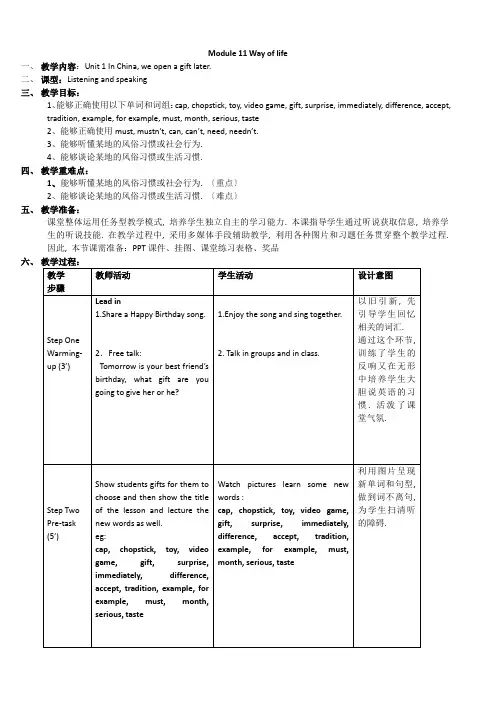
Module 11 Way of life一、教学内容:Unit 1 In China, we open a gift later.二、课型:Listening and speaking三、教学目标:1、能够正确使用以下单词和词组:cap, chopstick, toy, video game, gift, surprise, immediately, difference, accept,tradition, example, for example, must, month, serious, taste2、能够正确使用must, mustn’t, can, can’t, need, needn’t.3、能够听懂某地的风俗习惯或社会行为.4、能够谈论某地的风俗习惯或生活习惯.四、教学重难点:1、能够听懂某地的风俗习惯或社会行为. 〔重点〕2、能够谈论某地的风俗习惯或生活习惯. 〔难点〕五、教学准备:课堂整体运用任务型教学模式, 培养学生独立自主的学习能力. 本课指导学生通过听说获取信息, 培养学生的听说技能. 在教学过程中, 采用多媒体手段辅助教学, 利用各种图片和习题任务贯穿整个教学过程.因此, 本节课需准备:PPT课件、挂图、课堂练习表格、奖品六、七、板书设计:Module 11 Way of lifeUnit1 In China, we open a gift later.1. I don’t think I should open it now. In China, we open a gift later.2. …you mustn’t do any cleaning on the first day of the Spring Festival.3. You can’t be serious!达标训练题一.用所给词的适当形式填空:1. Can she __________ (do) the cleaning for me?2. Happy ___________ (birth) to you, Jim.3. It’s too difficult for me ____________ (understand) this math problem.4. I think you mustn’t _________ (open) the gift now.5. Can you use _____________ ( chopstick)?二、完成句子:1. 你必须等会儿翻开它.You ________________ and open it _________________.2. 我注意到另一个不同.I noticed _________ ______________.3. 你不能够打破这里的任何东西.You ____________ ___________ anything here.4. 请多注意交通规那么.Please ________ __________ ___________ to the traffic rules.5. 你没必要等.You ____________ _______________.Unit 1 While the lights were changing to red,a car suddenly appeared.教学目标【知识目标】1、能掌握本单元的单词和短语:bite, climb, hide, throw, fridge, pain, worse, medicine.2. 掌握本单元中的常用句型.【能力目标】1、能根据图片预测下文;能理解作者通过故事要传达的信息;能够理解语篇中故事发生的顺序.2、能够仿照范文, 用过去进行时对发生在周围的事故进行描述或报道.【情感态度目标】学习遇到突发事件时应沉着冷静, 尽量想方法自救的平安意识.教学重难点【教学重点】过去进行时, when和while引导的时间状语从句.【教学难点】能运用过去进行时就意外事故这一话题进行讨论.教学过程Step 1 Lead-inSs look the pictures and fill in the blanks.Step 2 Consolidate new wordsLook and say. The teacher shows the pictures of new words and let the students to say the new words as quickly as possible.Step 3 Say the meaning of the phrases.Work in pairs. Let Ss say the meaning of the phrases as quickly as possible.Step 4 Look at the pictures and say what’s happeningLook at the picture and use the words from the box to say what’s happening at that time.Step 5 Listen to Activity 2 and read1. The driver was/was not going fast.2. The driver was/was not looking.3. The driver was/was not talking on his mobile phone.Step 6 Listen to the dialogue and answer the questionsLet Ss listen to the dialogue and answer the two questions. Then check in groups.Step 7 Read the dialogue and answer the questions1. What was the boy doing when he was riding his bike?2. When did a car suddenly appear round the corner?3. Did the boy fall off his bike?Step 8 Read Activity 3 and complete the following advice.When you are riding a bike, think about the risk of an accident!Pay ___________ and stop at the___________.Don’t ______ too fast.Don’t ride ____________ with your friends.Don’t ______________!Step 9 Complete the passage with the correct form of the words from the box.Let Ss read the passage first and choose the words and expressions from the box. Step 10 Everyday EnglishAre you all right? That’s very dangerous!That’s too bad.Anything else?Step 11 Language pointsLet Ss master the main points of the passage.Step 12 Listen and mark when the speaker pauses1. Listen and mark when the speaker pauses.1) While the lights were changing to red, a car suddenly appeared round the corner.2) When I was waiting to cross the road, the accident happened.2. Now listen again and repeat.Step 13 Work in groups of fourStudent A: You’re a policeman at an accident scene in the street. Ask people questions. Student B, C and D: You saw the accident. Answer the policeman’s questionsStep 14 Grammer掌握过去进行时的用法.Step 15 Summary重点短语in time fall off pay attention side by side过去进行时Step 16 ExercisesDo some exercises about the main points.Step 17 中考链接Do the exercises in the entrance exam to senior high schools.课堂作业编写一个对话,介绍你亲眼目睹的一次交通事故.教学反思。
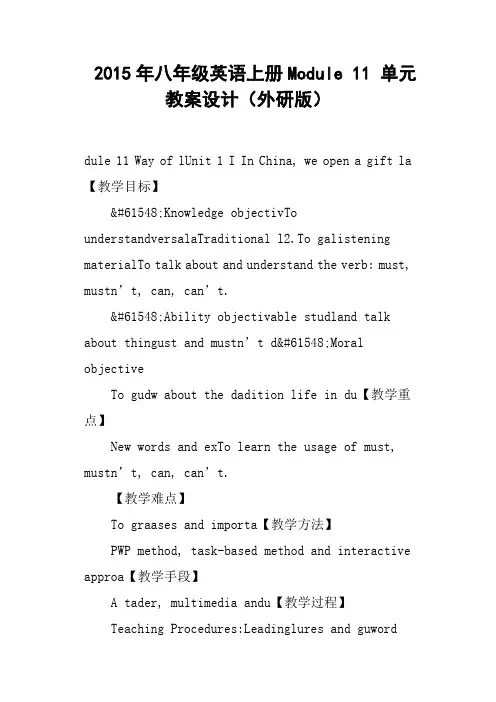
2015年八年级英语上册Module 11 单元教案设计(外研版)dule 11 Way of lUnit 1 I In China, we open a gift la 【教学目标】Knowledge objectivTo understandversalaTraditional l2.To galistening materialTo talk about and understand the verb: must, mustn’t, can, can’t.Ability objectivable studland talk about thingust and mustn’t dMoral objectiveTo gudw about the dadition life in du【教学重点】New words and exTo learn the usage of must, mustn’t, can, can’t.【教学难点】To graases and importa【教学方法】PWP method, task-based method and interactive approa【教学手段】A tader, multimedia andu【教学过程】Teaching Procedures:Leadinglures and guwordaccording2 Consolidate new wordsLook and say. The teawuw words and ludaw words as quickly as possiblListen and number the words and exas you heaLet Ss lape and number the words and exThen draw answudawords and exActivity 1 wuRead the words and exandght pictuLActivity 1 and answer the quListen and answer the question: Whado they want to buy for Lingling?Read the dialogue and answer the quWhen can peopla?2.Where must peopldiately?3.Do people accept awith both handWest?Now check(√) what you usually daMustMustn’t /Can’adiately when you receiv2. Accept awith both handUse red pagbaDo cleaningdag FestivalBreag duringg FestivalHave your hair cut duringg Festivallassage wwordboxRead the passage and fillblanks wwordveryday Englu remembered!What a surprise!It’s a bad luck!You can’t be serious!Perfect!0 LanguagLet Ss maaassagRead andpredict howaker will the underlined wordI don’I shouldw.2. You needn’t wait!u mustn’t break anythingu must only use red pagbau’d bave your hair cut duringg Festival2 Now listen andwhat you have listenedReadingWairs. ReadversaActivity 5 aloudlablThink about what you must and mustn’t/can’t duations. WustMustn’t /Can’tAt school Put up your hand bu talkAt the dining table talk with food in your mou2. Now wairs. Say what you must and mustn’t/ can’t dGrammarmust/can的用法。
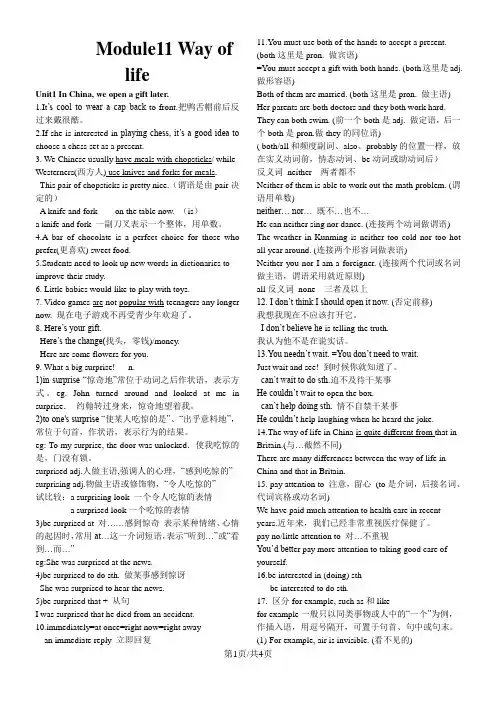
Module11 Way oflifeUnit1 In China, we open a gift later.1.It’s cool to wear a cap back-to-front.把鸭舌帽前后反过来戴很酷。
2.If she is interested in playing chess, it’s a good idea to choose a chess set as a present.3. We Chinese usually have meals with chopsticks/ while Westerners(西方人) use knives and forks for meals.This pair of chopsticks is pretty nice.(谓语是由pair决定的)A knife and fork ___ on the table now. (is)a knife and fork 一副刀叉表示一个整体,用单数。
4.A bar of chocolate is a perfect choice for those who prefer(更喜欢) sweet food.5.Students need to look up new words in dictionaries to improve their study.6. Little babies would like to play with toys.7. Video games are not popular with teenagers any longer now. 现在电子游戏不再受青少年欢迎了。
8. H ere’s your gift.H ere’s the change(找头,零钱)/money.Here are some flowers for you.9. What a big surprise! n.1)in surprise “惊奇地”常位于动词之后作状语,表示方式。

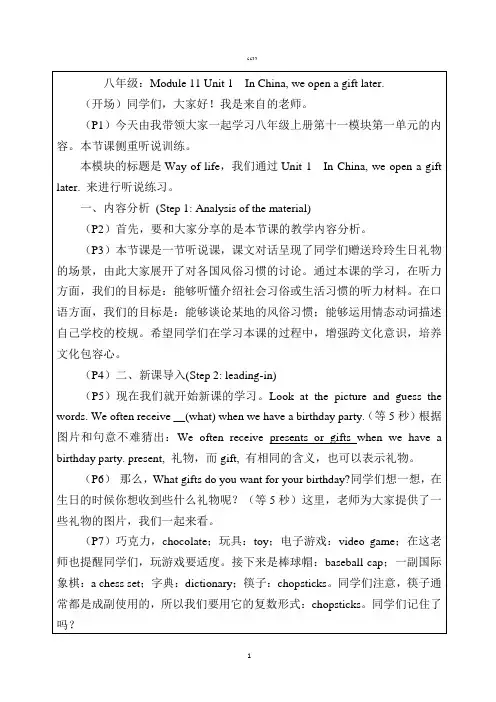
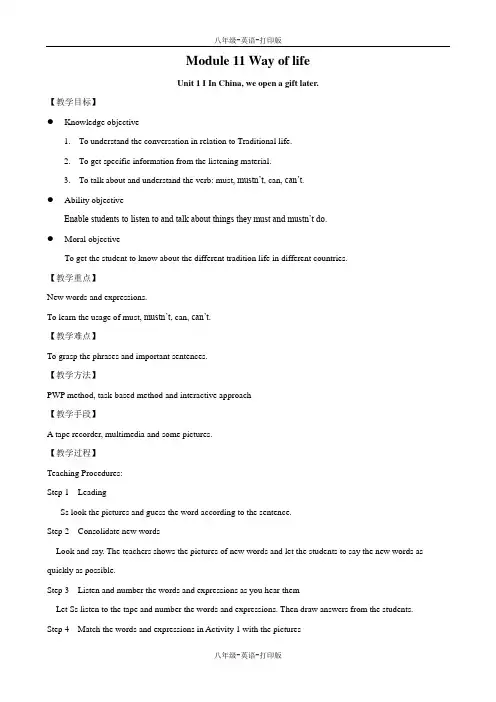
Module 11 Way of lifeUnit 1 I In China, we open a gift later.【教学目标】●Knowledge objective1.To understand the conversation in relation to Traditional life.2.To get specific information from the listening material.3.To talk about and understand the verb: must, mustn’t, can, can’t.●Ability objectiveEnable students to listen to and talk about things they must and mustn’t do.●Moral objectiveTo get the student to know about the different tradition life in different countries.【教学重点】New words and expressions.To learn the usage of must, mustn’t, can, can’t.【教学难点】To grasp the phrases and important sentences.【教学方法】PWP method, task-based method and interactive approach【教学手段】A tape recorder, multimedia and some pictures.【教学过程】Teaching Procedures:Step 1 LeadingSs look the pictures and guess the word according to the sentence.Step 2 Consolidate new wordsLook and say. The teachers shows the pictures of new words and let the students to say the new words as quickly as possible.Step 3 Listen and number the words and expressions as you hear themLet Ss listen to the tape and number the words and expressions. Then draw answers from the students. Step 4 Match the words and expressions in Activity 1 with the picturesRead the words and expressions and choose the right pictures.Step 5 Listen to Activity 1 and answer the questionsListen and answer the question: What present do they want to buy for Lingling? Step 6 Read the dialogue and answer the questions1.When can people open the present in China?2.Where must people open the present immediately?3.Do people accept a present with both hands in the West?Step 7 Now check(√) what you usually do in ChinaStep 8 Complete the passage with the correct form of the words from the box Read the passage and fill in the blanks with the correct form of the words.Step 9 Everyday EnglishOh, you remembered!What a surprise!It’s a bad luck!You can’t be serious!Perfect!Step 10 Language pointLet Ss master the main points of the passage.Step 11 Read and predict how the speaker will the underlined words1. I don’t think I should open it now.2. You needn’t wait!3. You mustn’t break anything.4. You must only use red paper for hongbao.5. You’d better not have your hair cut during the Spring Festival month.Step 12 Now listen and checkCheck what you have listened.Step 13 ReadingWork in pairs. Read the conversation in Activity 5 aloud.Step 14 Complete the table1. Think about what yo u must and mustn’t/can’t do in the situations. Write notes.2. Now work in pairs. Say what you must and must n’t/can’t do.Step 15 Grammarmust/can的用法。
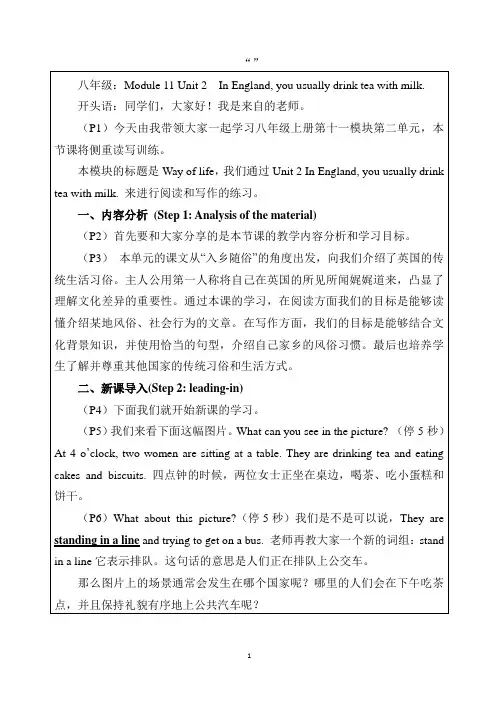
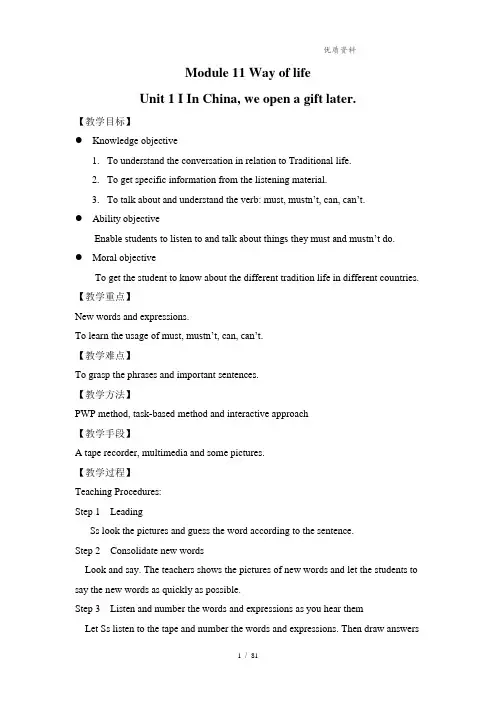
Module 11 Way of lifeUnit 1 I In China, we open a gift later.【教学目标】●Knowledge objective1.To understand the conversation in relation to Traditional life.2.To get specific information from the listening material.3.To talk about and understand the verb: must, mustn’t, can, can’t.●Ability objectiveEnable students to listen to and talk about things they must and mustn’t do.●Moral objectiveTo get the student to know about the different tradition life in different countries. 【教学重点】New words and expressions.To learn the usage of must, mustn’t, can, can’t.【教学难点】To grasp the phrases and important sentences.【教学方法】PWP method, task-based method and interactive approach【教学手段】A tape recorder, multimedia and some pictures.【教学过程】Teaching Procedures:Step 1 LeadingSs look the pictures and guess the word according to the sentence.Step 2 Consolidate new wordsLook and say. The teachers shows the pictures of new words and let the students to say the new words as quickly as possible.Step 3 Listen and number the words and expressions as you hear themLet Ss listen to the tape and number the words and expressions. Then draw answersfrom the students.Step 4 Match the words and expressions in Activity 1 with the picturesRead the words and expressions and choose the right pictures.Step 5 Listen to Activity 1 and answer the questionsListen and answer the question: What present do they want to buy for Lingling? Step 6 Read the dialogue and answer the questions1.When can people open the present in China?2.Where must people open the present immediately?3.Do people accept a present with both hands in the West?Step 7 Now check(√) what you usually do in ChinaStep 8 Complete the passage with the correct form of the words from the box Read the passage and fill in the blanks with the correct form of the words.Step 9 Everyday EnglishOh, you remembered!What a surprise!It’s a bad luck!You can’t be serious!Perfect!Step 10 Language pointLet Ss master the main points of the passage.Step 11 Read and predict how the speaker will the underlined words1. I don’t think I should open it now.2. You needn’t wait!3. You mustn’t break anything.4. You must only use red paper for hongbao.5. You’d better not have your hair cut during the Spring Festival month.Step 12 Now listen and checkCheck what you have listened.Step 13 ReadingWork in pairs. Read the conversation in Activity 5 aloud.Step 14 Complete the table1. Think about what yo u must and mustn’t/can’t do in the situations. Write notes.2. Now work in pairs. Say what you must and must n’t/can’t do.Step 15 Grammarmust/can的用法。
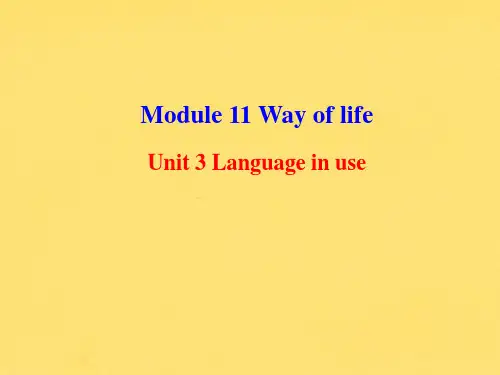
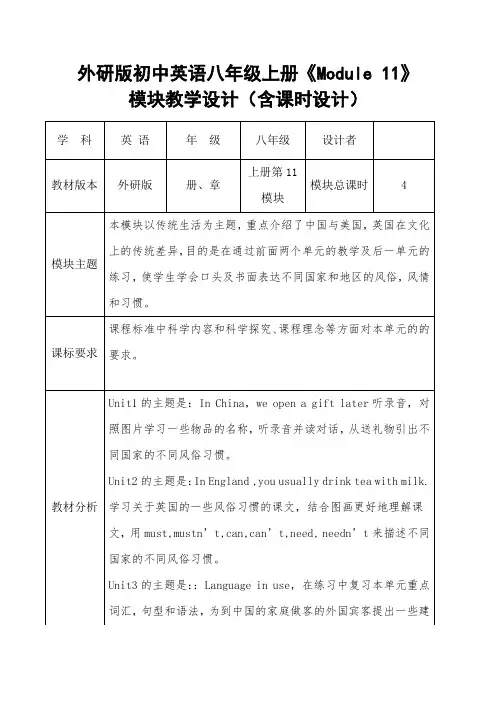
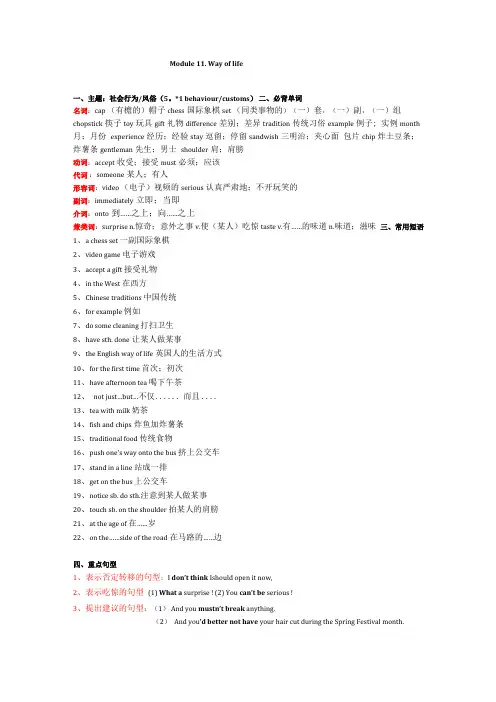
Module 11. Way of life一、主题:社会行为/风俗(5。
*1 behaviour/customs)二、必背单词名词:cap (有檐的)帽子chess国际象棋set (同类事物的)(一)套,(一)副,(一)组chopstick筷子toy玩具gift礼物difference差别;差异tradition传统习俗example例子; 实例month 月;月份experience经历;经验stay逗留;停留sandwish三明治;夹心面包片chip炸土豆条;炸薯条gentleman先生;男士shoulder肩;肩膀动词:accept收受;接受must必须;应该代词:someone某人;有人形容词:video (电子)视频的serious认真严肃地;不开玩笑的副词:immediately立即;当即介词:onto到……之上;向……之上兼类词:surprise n.惊奇;意外之事v.使(某人)吃惊taste v.有……的味道n.味道;滋味三、常用短语1、a chess set 一副国际象棋2、video game 电子游戏3、accept a gift 接受礼物4、in the West 在西方5、Chinese traditions 中国传统6、for example 例如7、do some cleaning 打扫卫生8、have sth. done让某人做某事9、the English way of life英国人的生活方式10、for the first time 首次;初次11、have afternoon tea 喝下午茶12、not just…but…不仅...... 而且....13、tea with milk 奶茶14、fish and chips炸鱼加炸薯条15、traditional food 传统食物16、push one's way onto the bus 挤上公交车17、stand in a line 站成一排18、get on the bus 上公交车19、notice sb. do sth.注意到某人做某事20、touch sb. on the shoulder 拍某人的肩膀21、at the age of 在……岁22、on the……side of the road在马路的……边四、重点句型1、表示否定转移的句型:I don’t think Ishould open it now,2、表示吃惊的句型(1) What a surprise ! (2) You can’t be serious !3、提出建议的句型:(1) And you mustn’t break anything.(2)And you’d better not have your hair cut during the Spring Festival month.(3)Let’s celebrate Lingling's birthday first !五、模块语法情态动词must、can 和need 的用法(You must say Mr or Mrs when you meet someone for the firsttime./You can take it away./ You needn’t wait!)1.Here’s your 91化这是给你的礼物。
Module 11 Way of lifeUnit 1A: Here’s a birthday gift for you, Bob. I hope you accept it and love it.B: It’s a chess set. Thanks a lot, Jack.A: Here is a video game. Grace asked me to send it to you.B: What a surprise! Grace stopped playing games for a few months. She is more serious now and she likes making works of arts. For example, she can make cloth toys, paper caps and wood chopsticks.A: No surprise. Grace knows you are interested in games.B: That’s true. Look! Here is a box of chocolate. Shall we open the box and taste it?A: Better not now. According to our tradition, you must not open these gifts immediately. You may open them after we leave.B: What a difference!A: …1. cap n.(有檐的)帽子2. chess n.国际象棋3. set n. (同类事物的)(一)套,(一)副,(一)组4. chopstick n.筷子5. toy n.玩具6. video adj.(电子)视频的【新义:n.录像】7. gift n.礼物【新义:n.天赋】8. surprise n.惊奇;意外之事v.使(某人)吃惊9. immediately adv.立刻;当即10. difference n.差别;差异11. accept v.收受;接受12. tradition n.传统习俗13. example n.例子;实例【新义:n.榜样】14. must v.aux. 必须;应该15. month n.月;月份16. serious adj.认真严肃的;不开玩笑的【新义:adj.严重的】17. taste v.有……的味道;n.味道;滋味【新义:n.吃(或喝)一小点;鉴赏力】1. surprise n.惊奇;意外之事v.使(某人)吃惊→surprised adj.惊奇的;惊讶的surprising adj.令人惊讶的2. immediate adj.立即的→immediately adv.立刻;当即3. different adj.不同的→difference n.差别;差异4. tradition n.传统习俗→traditional adj.传统的1. baseball cap棒球帽2. a chess set 一副国际象棋3. video game 电子游戏4. for example例如5. do some cleaning打扫卫生6. on the first day of the Spring Festival大年初一7. in the north of China在中国北方1. 这是给你的礼物。
润安公学第一学期分层走班教学
八年级英语学科C层讲学稿(No. 62)
课题:Module 11 The weather
Unit 1 It may be cold tomorrow. (2课时)
主备人:审核人:审批时间:
班级:学生姓名:使用时间:
【Learning Objects学习目标】
1、知识目标:
会读、会写本课的新词汇:cloud, shower, centigrade, degree, temperature,
freezing, snowy, joke, wet, might, windy, probably, sunny, cool, dry, cloudy.
和短语;能理解并朗读本课的对话。
2、能力目标:
能够使用关于天气的一些词汇以及表示可能性的一些词汇。
3、情感目标:
树立自信心,敢于用本课所学知识开口谈论天气,试试看。
4、学习策略:
在课内外学习活动中用英语就“天气”话题与人交流。
5、文化意识:
初步了解英语国家的气候特点。
【Learning Important Points学习重点】
表示天气的一些词汇和句型。
【Learning Difficult Points学习难点】
能够用自己的语言简单地描述各地的天气情况。
【Learning Procedures学习过程】
Preview(预习·导学):
1、预习课本187页标有(88)、(89) 的单词,对照音标试着拼读并掌握拼写和中文意思。
2. 在课文中找到下列词组或句子,并试着写出下其汉语意思
(1). You must be joking. _________
(2). We’re off to Hong Kong________________
(3). Come on, better get going. _____________
(4). sound great ______________
(5). It may not be cold.
【Class Activities 课堂活动】
Step1 Feedback on the preview
讨论解决预习中存在的问题(师生互问探讨)。
Step2 Key vocabulary
Read the new words after the teacher, then read together, try to know the meanings of these words in class.
Step3. Do Activity1.
1. Read the words about the weather: cloud, rain, showers, snow, storm, sun, wind.
2. Match the words with the symbols.
Step4 .Listen and finish Activity2
Listen to the tape and check the correct information in the table.
Step 5. Listen and read.
1. Listen to the tape and fill in the blanks.
(1). We’re going shopping for Lingling’s .
(2). The weather in England may not even be , just .
(3). At the moment, it’s in Australia, so it’ll be hot
and sunny.
(4). Betty is going to buy something to wear for Lingling.
2. Read the dialogue fast and complete the table in Activity 5.
3. Read the dialogue carefully and check the true sentences in Activity 6.
Step6. Learn and discuss some language points.
Step7. Pronunciation and speaking(Activities 7-9)
Step 8. Exercises.
I. 用所给单词的适当形式填空。
1. On _______ (rain) days, we’d better stay at home to do some reading.
2. You must be (joke).
3. The sun _______ (shine) brightly now, so it’s very (sun).
4. There will be _______ (wind) in Shanghai tomorrow.
5. It’s much _______ (wet) than it was yesterday.
III. 根据汉语完成句子,每空一词。
1. 下周日天气会怎样?
_______ _______ the weather _______ _______ next Sunday?
2. 英国的冬季总是温暖而干燥。
It’s always _______ and _______ _______winter in England.
3. 何时是参观你们国家的最佳时间。
_______ is the _______ time_______ _______ your country?
4 现在出去散步怎么样?
_______ _______ going out _______ a walk?
5. 北京是中国最大的城市之一。
Beijing is _______ _______ _______ _______ cities in China.
6. 别忘了下周琳琳的生日。
Lingling’s birthday next week.
7. 现在的澳大利亚可能是晴天,还很热。
,it’s be sunny and hot.
8. 去美国的最佳时间是何时?
When is the USA?
Step9. Homework.
1. Revise the key words and expressions and recite them.
2. Revise the language points.
3. Read the dialogue and finish the exercises in the workbook(Activities 1-3) 【学生自查】(本节课不懂之处)
【教学反思】。